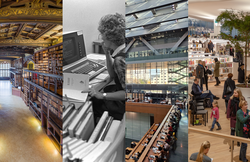
Back Rechtsbibliothek German Νομική βιβλιοθήκη Greek Bibliothèque de droit French Biblioteca jurídica Portuguese சட்ட நூலகம் Tamil
The examples and perspective in this article may not represent a worldwide view of the subject. (January 2011) |

| Part of a series on |
| Library and information science |
|---|
 |
A law library is a specialist library used by law students, lawyers, judges and their legal assistants, and academics in order to research the law or its history. Law libraries can also be used by others who work in local government or legislatures to assist with drafting or advocating for laws, as well as individuals who are party to a case, particularly self represented, or pro se in the United States, litigants, who do not have legal representation.
A law library may contain print, computer assisted legal research, and microform collections of laws in force, session laws, superseded laws, foreign and international law, and other research resources, e.g. continuing legal education resources and legal encyclopedias (e.g. Corpus Juris Secundum among others), legal treatises, and legal history. A law library may also have law librarians who help legal researchers navigate law library collections and who teach legal research. Some law libraries serve scholars from around the world, e.g. Institute of Advanced Legal Studies in London and the New York City Bar Association Law Library.
Law libraries in the United States are usually classified as a type of special library because of their focus on providing specialized resources, as well as their specialized and limited user base.
Most law schools around the world have a law library, or in some universities, at least a section of the university library devoted to law. In the United States, law school libraries may be subject to accreditation review by the American Bar Association Standards of Legal Education.
Law libraries may be found in courts (e.g. judge's chambers), legislatures (e.g. the Law Library of Congress), prison libraries, government departments, private law firms, and barristers' chambers.
© MMXXIII Rich X Search. We shall prevail. All rights reserved. Rich X Search